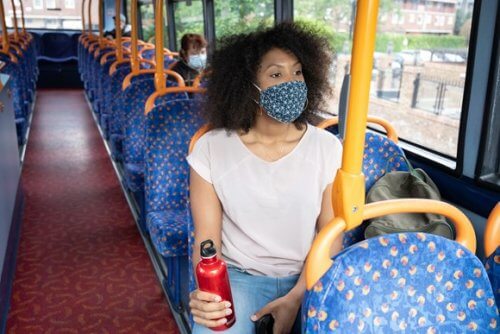The government says it will work with operators to make it mandatory for passengers to wear face coverings when using public transport in England, Transport Secretary Grant Shapps announced on 4 June. It says that wherever possible people should continue to avoid public transport and use alternatives such as walking, cycling or driving, but for some people this may not be an option.
This is a response to transport usage increasing as people return to work, and since people may be more likely to be in enclosed spaces for longer periods of time there is a greater risk of the spread of COVID-19, and social distancing is likely to be difficult to follow consistently. The government states that this differs from enclosed spaces such as shops where people can more easily go outside if social distancing is not possible and where shop owners can place limits on the number of customers allowed inside at any one time. The Scientific Advisory Group for Emergencies (SAGE) has set out that using face coverings on public transport can provide some small additional protection to fellow passengers and can help people to avoid unknowingly spreading the virus if they are suffering from coronavirus, but not showing symptoms.

Speaking at the Downing Street coronavirus briefing, The Transport Secretary confirmed the government is asking operators to introduce face coverings as a requirement for travel from 15 June, and said it will work closely with the transport industry to help implement the plans. The changes will be made under legislation such as the National Rail Conditions of Travel and Public Service Vehicle Regulations for buses. While the government expects the vast majority of people to comply with the changes, operators will be able to refuse travel or issue penalty fines for those who fail to wear a face covering, in a similar way to the rules on having a ticket for travel. British Transport Police will also support the implementation of these changes.
The government stressed that social distancing and hand washing remain by far the most important disease prevention measures but it is also vital all passengers travelling on buses, coaches, trains, trams, ferries and aircraft should wear a face covering, and said it will work with operators to ensure staff are provided with and wear face coverings where appropriate for their role.
People are reminded to wash their hands or use hand sanitiser before putting their face covering on and after taking it off and it is important that people don’t touch their face covering when wearing it, where possible, to avoid hand to mask transmission of the virus.
The Transport Secretary said: “People should continue to avoid public transport wherever possible. But, as restrictions are carefully eased when it is safe to do so, it’s likely that we will see more people needing to use public transport. So, while respecting social distancing and maintaining good hand hygiene remain the most important steps we can all take to stay safe, wearing a face covering can play a role in helping us to protect each other. This is about the small changes we can take to help control the virus, which is why I urge everyone using transport to wear a face covering, to help keep us all safer.“
It is important to remember that face coverings are not the same as face masks, and people should not use medical grade PPE masks to ensure these remain available for frontline staff. Last month, the government set out advice for people on how to make their own face coverings easily at home, using scarves or other textile items, which cover the mouth and nose while allowing the wearer to breathe comfortably and can be as simple as a scarf or bandana that ties behind the head to give a snug fit.
Mr Shapps said that very young children, disabled people and those with breathing difficulties would be exempt from the rule, and was optimistic that the majority of passengers would want to “do the right thing” and comply with the changes but operators will be able to issue penalties for those who do not, in a similar way to people who travel without a ticket.
In response to the announcement, CPT Chief Executive Graham Vidler said: “Buses are already safe to use as operators have introduced enhanced cleaning regimes alongside other measures including restricting capacity, but making face coverings mandatory will give more passengers the confidence to travel.
“We will need passengers to work with us and wear their own face covering to comply with this new requirement. We will also work with the Government on its implementation, including increasing capacity in the network and maximising the value of the bus in safely restarting our economy and daily life.”
In Scotland, First Minister Nicola Sturgeon said her government was considering whether to make it mandatory to wear face coverings in some situations. Scotland currently recommends wearing coverings in shops and on public transport, whilst in Wales, face coverings have not yet been recommended for the general public. In Northern Ireland, people have been told to consider wearing them in places where they cannot observe social distancing.
Scientific advice suggests that, although face coverings are unlikely to prevent an individual from catching the coronavirus, they can help prevent someone who is infected from infecting others and therefore help control the virus.
In London, TfL has been running a far-reaching communications campaign to encourage the use of face coverings, with posters, radio and other advertisements, announcements and millions of emails sent to customers. The latest estimates suggest that between 30-50 per cent of customers on public transport are now protecting other passengers and staff by using a face covering, with the new requirements designed to make face coverings the norm.
Mayor of London Sadiq Khan said: “I’m pleased that our lobbying has paid off and the government has finally seen sense and made it mandatory for people to wear face coverings on public transport. This is something I and others have been calling on ministers to do for some time, and is in line with a large body of evidence that they can help stop the spread of coronavirus.
“I encourage anyone travelling on public transport, or anywhere you can’t keep a safe two-metre distance, to wear a face covering, but from Monday 15 June, everyone must wear a covering over their nose and mouth for the entirety of any journeys made using the public transport network. This will be mandatory and will help everyone be safer.
“TfL continues to work hard to maximise services despite staff being ill, shielding or self-isolating. The reality is that due to social distancing the effective capacity of public transport services has been dramatically reduced. We can only carry between 13-15 per cent of passengers. We all must play our part by working from home if we can and making journeys on foot or by bike if at all possible in order to keep the service safe for those who really need it. I want to thank Londoners who have made monumental sacrifices over the last ten weeks and stuck to the rules. I urge them to continue to do so to help save lives.”
In the north of England, Transport for the North (TfN) welcomed the initiative. Barry White, TfN Chief Executive, said: “We are acutely aware that, as lockdown measures continue to evolve and public transport usage increases, there are likely to be occasions were social distancing is either difficult or, at times not possible.
“Whilst we are working closely with the transport sector to support safe travel wherever we can, measures such as the use of face coverings, where public transport is the only option for essential travel, clearly make sense.
“A huge amount of work is going on across the transport sector in the North to enable effective social distancing on stations, on trains and at major interchanges. This work is being done, not only to support travellers, but those who provide the services they use.
“We would urge people to continue to work from home if they are able to, to consider alternatives to public transport if they can, and if they do have to use public transport for essential travel, to follow the guidelines and advice that has been set out for everyone’s benefit.”


